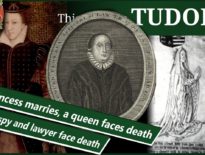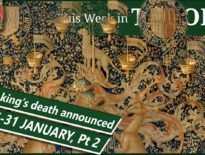In this first part of "This week in Tudor history", I look at Tudor history events for 1st, 2nd and 3rd February.
1st February 1552, in the reign of King Edward VI - The birth of Roger Cooke, an alchemist who worked for Dr John Dee, Francis Anthony, the Wizard Earl (Henry Percy, 9th Earl of Northumberland) and Sir Walter Ralegh, and a man with whom Dee shared the secret of a special elixir.
2nd February 1508, in the reign of King Henry VII - The death of physician and Provost of King's College Cambridge, John Argentine. Argentine was said to have been the last person to have attended on the Princes in the Tower before their disappearance.
3rd February 1478, in the reign of King Edward IV - The birth of Edward Stafford, 3rd Duke of Buckingham. Buckingham was executed for alleged treason in 1521, but it appears that his downfall was more to do with King Henry VIII's fear of Buckingham's wealth, importance and Plantagenet blood.
Other Tudor events for these dates:
The Private Diary of John Dee - https://www.gutenberg.org/files/19553/19553-h/19553-h.htm
Francis Anthony and his drinkable gold - https://youtu.be/UPf24CDIVTo



I don’t believe the trial of Buckingham was rigged, as an investigation had taken place, but like most treason trials we might be suspicious of the process as these trials were to make a show of the Royal power and were not about justice. One might also be a bit suspicious of some of the evidence, the popularity of the Duke and his royal blood. Edward Stafford also fell foul of Thomas Wolsey who insulted his dignity and honour by placing his hands in the bowel for used for the King to wash his hands in. The Duke was so outraged at this breach of protocol that he threw the water over the Cardinal’s shoes and was made to apologise and Wolsey was provided with new shoes. Wolsey was involved in a premature investigation in 1518 of Buckingham, Norfolk and Suffolk, from which nothing emerged. Buckingham was spied on by a plant in his service, one Charles Knyvett and a number of things reported back on the Duke’s intentions and conversations. However, some of the accusations are no doubt dubious, such as his repeating the words of his father when he was to be convicted by Richard iii. No contemporary source supported the second Duke saying he would come into the King’s presence and stab him. If those words existed at all they are from Shakespeare or Thomas More, the two sources which require a huge pinch of salt. Buckingham was definitely a rival and the son of a traitor, proud, haughty and his family probably did think the Tudors were upstarts, but there isn’t much to pin him down to actually wanting to replace Henry on the throne. Treason doesn’t always mean that, however, and there was sufficient in the King’s mind to make a case for treason. Buckingham had vast estates, his arms promoted the Plantagenet blood, as did private decoration at home, he had a private army, a wide affiliation across the South and Wales and he was capable of raising and leading an army. While I doubt he was guilty of rebellion and planning to overthrow and kill the King, I do believe that he was involved in something which could be construed as treason and conspiracy.
Do we see here the early signs of paranoia? Henry was easily manipulated at times, he could actually be more than a little naive at times and his judgment was often rash. Henry during these years was welcoming, warm, friendly, even merciful, a far cry from the tyrant he developed into, with few political executions during these first two decades, but he was also ruthless and insecure. If that sounds like a personality which contradicts itself, then that describes Henry Viii perfectly. The majority of the time Henry was perfectly reasonable but with no male heir, when a perceived threat appeared Henry dealt with it with deadly force. He didn’t strike at once, which is a bit odd if you see someone as a threat, no, Henry took his time, forcing his enemies to reveal themselves and their intentions, while his men devised the best way to make the charges stick.
Now these are a few trials I would rig, in favour of those being tried, the other way so as they were found not guilty.
I would also rig the trial of Anne Boleyn and the five men with her in reverse so in her favour and the trial of Henry Howard in his favour and several more.
I would round up Robin Hood types to rescue Margaret Pole and her family and depose Henry by rigging Parliament.